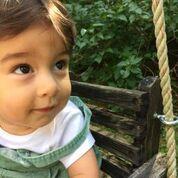Believe in Bodhi
GEMSS would like to thank Bodhi and his mother for their generosity in sharing this story with us. You have made the site come to life with the addition of your thoughts and feelings. Thank you so much!

His big brown eyes took in the stranger joining him at the kitchen table, then, slowly, a beautiful smile spread across his face. He was soon chatting and trying to share his bagel and mandarin orange. When people meet Bodhi, says his mother Déodonné, he immediately engages them and makes people smile and laugh. “He is really observant and reads people’s energy. What he lacks in physical strength, he makes up for in spirit!” Soon, another visitor entered and Bodhi clasped his hands together, bowed his head, and said “Namaste” to her.

Déodonné gets so much hope from his smile and listening to him chatter. When she feels overwhelmed by the future and the challenges it may bring, being with Bodhi brings her back to a hopeful place.
Bodhi. His name comes from the “tree of enlightenment” and speaks to his father’s roots in Nepal. Friends and family have joined together to paint an intricate and beautiful mural of a Bodhi tree in his bedroom. Meeting him was such a true honor – his spirit is so full of something very brilliant.
At 18 months, Bodhi is a busy boy. In his early intervention program, he gets PT, OT, and aquatherapy. In addition, a nutritionist comes to his home. He also has a PT and nutritionist through his consultation from a large hospital’s children’s clinic. To ensure continuity and quality of care, his family coordinates the connections between providers and has organized Skype sessions between their hospital-based team and their local therapists.
Bodhi has started horseback riding on a friend’s farm. He really connects to the horse and gently pats her as he rides with his mother. He is working on strengthening his core muscles as the horse shifts Bodhi’s weight from side to side, mimicking the feeling of walking deep in his hips.
Bodhi was diagnosed with Spinal Muscular Atrophy (SMA), Type 2 when he was about 12 months old, after his gross motor skills seemed to plateau. SMA is rare, affecting around 1 in 10,000 births, and they know of only a couple of other SMA families in this state.
Bodhi’s family has been very involved in his care and raising awareness of SMA. His eight-year-old cousin held a neighborhood bake sale and raised $400 for Cure SMA. Other family members joined the annual Cure SMA Walk & Roll and raised nearly $3,000 for the organization. Their team name was “Believe in Bodhi.” They have become involved with raising awareness through both traditional and social media. Their state-wide newspaper featured Bodhi on its front page and the family even got their Governor to proclaim August as SMA Awareness Month.
Déodonné, who was wearing a shirt that read, “Never Give Up,” offers some Advice to Parents that helped her when Bodhi was first diagnosed:
- Take care of the breathing. They use a cough assist machine (Mr. Coughy) every day, paired with tooth brushing. He uses a nebulizer when needed and uses an oxygen monitor for 1 hour/week in his sleep.
- Diagnosis is overwhelming. Take it one day at a time.
- Get involved with Cure SMA. When they reached out to the organization just after his diagnosis, they got a care package with a wagon, a swing, toys, etc. and the organization helped the family attend the annual Cure SMA conference. Although the conference was overwhelming, just after the diagnosis, they learned so much from the SMA specialists, researchers, and other parents.
- Going public is helpful for increasing awareness. “It was like a big weight was lifted,” says Deodonne. She added that it is a way of “allowing others to show the best of them to you” as they offer support.
Déodonné offered some thoughts and Advice for Teachers, Therapists and Professionals.
- Assume competence in the children. What they lack in musculature, they make up for in their brightness and insightfulness. Assume he will be able to keep up. And don’t judge people by how they present or look.
- Be knowledgeable about SMA and learn the methods for handling him to protect his bones during transfers. Partner with the parent to create training specific to that child.
- Respect his dignity and privacy. Allow him to do as much as possible. Ensure his safety from afar and don’t insert adults into the mix as he forms relationships and friendships.
- Help him find the right balance, for example, between independence and fatigue.
